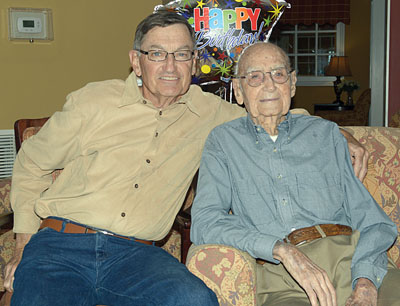WWII veteran turns 100
 Wilbur, right, with his son, Jim Lawson, is an Arbor Terrace Assisted Living and Memory Care resident who celebrated his 100th birthday with a party April 7.
Wilbur, right, with his son, Jim Lawson, is an Arbor Terrace Assisted Living and Memory Care resident who celebrated his 100th birthday with a party April 7.
“I didn’t think I would [live that long],” said Wilbur, a resident of Arbor Terrace Assisted Living and Memory Care facility in Cedar Bluff.
Nevertheless, Wilbur celebrated his milestone with his family and fellow residents with a party Saturday, April 7, at the Stables at Hunter Valley Farm, 9111 Hunter Valley Lane, Knoxville.
“I feel great,” he said. “I’m just glad I still have a few marbles upstairs.
“I think maybe being healthy,” Wilbur said was one reason for his longevity. “I did a lot of laboring — and whatever — outside. You know, working on the farm.”
Wilbur and the late Lillian Lawson, his wife of 66 years, had two sons, Robin who was born in Bristol, England, and Jim Lawson. Wilbur Lawson has four grandchildren and four great-grandchildren. Lillian, to whom he was married for 66 years, died in 2010.
“He was a great father,” Jim said. “He was pretty strict when I was younger. They taught us work values — to work hard and get an education.”
Wilbur was born April 5, 1918, to Oliver and Hettie Lawson, the oldest of four, in Wears Valley.
“There weren’t any hospitals in those days” so he was born at home, Wilbur said. He grew up on a farm with his younger brother, the late Dewey Lawson, and two sisters, Betty Coulter and the late Dorothy Newman.
As a young man, Wilbur served in the Civil Conservation Corps,
for which he worked in Great Smoky Mountain National Park. The CCC was a work relief program, started by President Franklin Delano Roosevelt in 1933, to give young men employment
opportunities on conservation projects.
“I was working trail maintenance for the Smoky Mountain Park on Mount LeConte when I was drafted in the Army [June 5, 1941],” he recalled.
“In those days, the bears liked to chew on the [wooden] trail signs. I don’t know why,” he said and laughed. “We replaced the signs and some of the people in the park put barbed wire on the edge of the signs to keep the bears from chewing on them.
“Then, [the bears] wouldn’t chew on them,” Wilbur added and laughed again.
He remembered the corps was operated like the military. “We had our captain in charge,” he said. “We dressed in Army uniforms.”
Although the federal government instituted the draft in 1940, when men trained and went in the reserves, Wilbur would not be called to serve in the Army until June 10, 1941. “I was looking to get out [of serving], and Pearl Harbor came along,” he said. He was 23 at that time. He would go from Fort Orville in Chattanooga; Camp Callan in San Diego, California; and then to Camp Buckner in the mountains of North Carolina, where he trained and marched in the snow.
“I didn’t bring any winter clothes,” Wilbur added. “It was cold, I tell you.”
Eventually, he made the trip to England. “We had a cruise on the ‘Saint Mary,’” he said. “That was an experience.
“I was in the E Deck and that was next to the cargo hold We got one meal a day,” Wilbur added. “It was reported there were over 19,000 troops on the ship, plus the ship’s crew.”
“There was a new British hospital,” he added. “I was assigned to transportation in the motor pool. I drove ambulances and trucks.”
While in Bristol, England, he met Lillian, whom Wilbur would date and later marry a year later in England.
Wilbur’s military duties would send him to France.
“We took over a hospital in Cherbourg,” he said. “Then in October, we moved the hospital to Liege, Belgium. They established a tent hospital out in the field.
“The officers and all were having a pow-wow,” Wilbur recalled. ”They just started the drive on [the Battle of] Saint-Lô in France. I was kind of there for that. We were in a big chateau, and you could hear the guns in Saint-Lô.
“They finished up there and we started up to Cherbourg, and there was a long stretch of road there,” he added. “The sun was pretty and there were apple orchards.
“The road was lined with troops heading to the front to Saint-Lô. Then, all of a sudden, I saw the men were falling over in the ditches and shooting. I glanced up and saw there was a German plane coming down the road, [shooting].”
He and the truck occupants went for cover in the apple orchards while troops shot down the plane. “[The plane] veered off the road and crashed in the apple orchard — a quarter of a mile from where I was,” Wilbur said.
Later, he was sent to Belgium to face a bad winter. “The Army had taken over Luxembourg Castle for a hospital,” Wilbur said. “They were short on supplies, and I took supplies to [the castle] I went through Bastogne and then back.That night is when the Battle of the Bulge started in Bastogne.”
However, he returned to his unit. “We lost so many troops that they pulled people out of the hospitals … and handed us rifles,” Wilbur said. “I went into [Gen. George] Patton’s 3rd Army, 65th Infantry Division.”
While in Germany he witnessed the sights inside a concentration camp. For a moment, Wilbur stopped speaking, only shaking his head. He was just outside Lenzing, Austria, when the war ended.
“I was asleep. It was 11 p.m.,” Wilbur said. “Then all hell broke loose.”
He was discharged in 1945. His wife would join him in February 1946.
“The Army sent all the war brides over on ships,” Lawson said. “They came back on shiploads.”
He and Lillian settled up in Wears Valley before moving to Oak Ridge, where Lawson was employed with the Atomic Energy Division.


